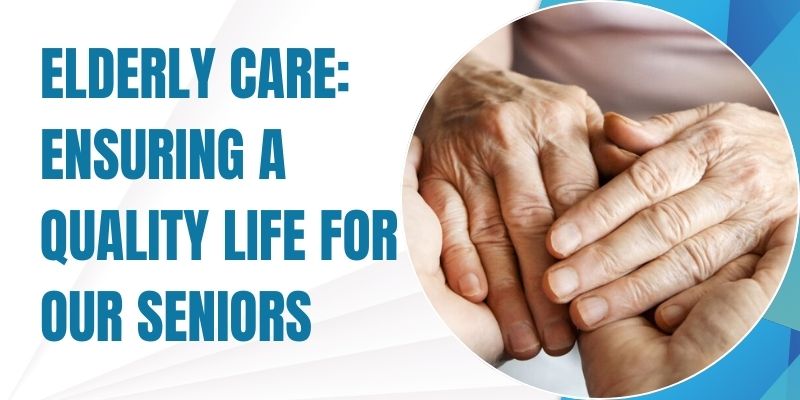As our population ages, providing high-quality care for the elderly has become increasingly important. Elderly care, also known as senior care, encompasses a range of services designed to meet the unique needs of older adults. These services aim to enhance their quality of life, ensure their safety, and promote their physical and mental well-being. In this article, we will explore the various aspects of elderly care, the challenges faced, and the solutions available to provide compassionate and effective care for our seniors.
Understanding Elderly Care
Elderly care involves a combination of medical and non-medical services that cater to the needs of aging individuals. It includes assistance with daily activities, medical care, emotional support, and specialized care for chronic conditions. The goal is to help seniors maintain their independence, dignity, and overall health as they age.
Types of Elderly Care
1. In-Home Care
In-home care enables seniors to receive assistance in the comfort of their own homes. This type of care is ideal for those who prefer to stay in familiar surroundings while receiving assistance with daily tasks such as bathing, dressing, meal preparation, and medication management. In-home care can be provided by family members, professional caregivers, or home health aides.
2. Assisted Living
Assisted living facilities offer a supportive environment for seniors who need help with daily activities but do not require round-the-clock medical care. Residents live in private or shared apartments and have access to various services, including meals, housekeeping, transportation, and recreational activities. Assisted living communities also provide social opportunities, reducing the risk of isolation and loneliness.
3. Nursing Homes
Nursing homes, also known as skilled nursing facilities, provide comprehensive medical care and assistance for seniors with serious health conditions or disabilities. These facilities have licensed nurses and medical professionals on staff 24/7 to address the medical needs of residents. Nursing homes offer a high level of care, including rehabilitation services, chronic disease management, and palliative care.
4. Memory Care
Memory care is a specialized form of elderly care designed for individuals with Alzheimer’s disease, dementia, or other cognitive impairments. Memory care facilities provide a safe and structured environment with trained staff who understand the unique challenges associated with cognitive decline. These facilities offer personalized care plans, engaging activities, and support to improve the quality of life for residents with memory-related conditions.
Challenges in Elderly Care
1. Health Conditions
As individuals age, they are more likely to develop chronic health conditions such as heart disease, diabetes, arthritis, and hypertension. Managing these conditions requires regular medical check-ups, medication management, and lifestyle adjustments. Coordinating care and ensuring adherence to treatment plans can be challenging for both seniors and their caregivers.
2. Mobility and Independence
Loss of mobility and independence is a common concern among the elderly. Age-related changes, such as decreased muscle strength and joint flexibility, can make it difficult for seniors to perform daily activities. This loss of independence can lead to feelings of frustration, depression, and a decreased quality of life.
3. Cognitive Decline
Cognitive decline, including conditions like dementia and Alzheimer’s disease, poses significant challenges in elderly care. Memory loss, confusion, and changes in behavior can affect a senior’s ability to communicate, make decisions, and manage daily tasks. Providing appropriate care and support for individuals with cognitive impairments requires specialized training and a compassionate approach.
4. Emotional Well-being
Social isolation and loneliness are common issues among the elderly, especially those living alone or in care facilities. A lack of social interaction can result in feelings of sadness, anxiety, and depression. Maintaining emotional well-being is crucial for seniors’ overall health and happiness.
Strategies for Providing Effective Elderly Care
1. Comprehensive Care Plans
Creating comprehensive care plans tailored to the individual needs of each senior is essential for effective elderly care. These plans should include medical care, assistance with daily activities, social engagement, and emotional support. Ongoing evaluations and modifications to the care plan keep it relevant and effective.
2. Support for Caregivers
Caregivers play a vital role in elderly care, and providing them with the necessary support and resources is crucial. Caregiver training programs, respite care services, and support groups can help caregivers manage stress, prevent burnout, and provide the best possible care for their loved ones.
3. Technology in Elderly Care
Technological advancements have transformed elderly care. Telehealth services enable seniors to consult with healthcare professionals from home, while wearable devices monitor vital signs and alert caregivers to potential health issues. Smart home technologies, such as fall detection sensors and medication reminders, enhance safety and independence for seniors.
4. Social Engagement Programs
Promoting social engagement is essential for the emotional well-being of seniors. Community centers, senior clubs, and volunteer organizations offer opportunities for social interaction, recreational activities, and lifelong learning. Encouraging seniors to participate in these programs can help reduce feelings of loneliness and improve their quality of life.
Conclusion
Elderly care is a multifaceted and dynamic field that requires a compassionate and comprehensive approach. By understanding the unique needs and challenges faced by seniors, we can provide effective care that enhances their quality of life. Whether through in-home care, assisted living, nursing homes, or memory care, the goal is to ensure that our elderly population receives the support and care they deserve. Embracing advancements in technology, supporting caregivers, and promoting social engagement are key components of successful elderly care. Together, we can create a caring and supportive environment where our seniors can thrive and enjoy their golden years with dignity and respect.

